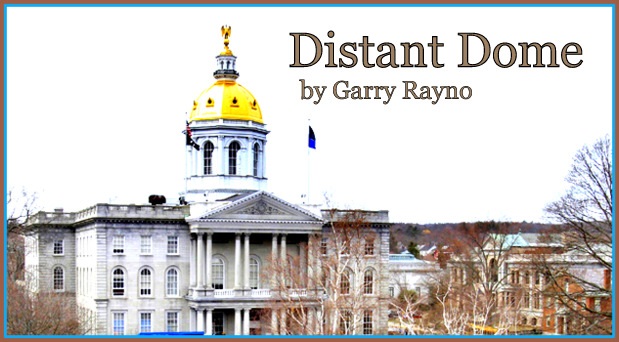Distant Dome is co-published by Manchester Ink Link and InDepthNH.org
By GARRY RAYNO, Distant Dome
Lawmakers gather in Concord Wednesday for a special session on taxes, not the state’s, but 45 other states with a green light to require Granite State businesses to be their sales tax collectors.
The US Supreme Court’s South Dakota versus Wayfair, Inc. decision overturned 50 years of precedent and allows sales tax states to collect from businesses without a physical presence in their state that sell products to their residents.
The Supreme Court’s 1992 case, Quill v. North Dakota (again), ruled consumers owe sales taxes on products purchased from businesses without a physical presence in their state, but did not require out-of-state sellers to collect the tax.
The court urged Congress to address the complicated issue but it never has.
The recent decision allows states to seek sales taxes from out-of-state businesses selling into their state, and that changes the equation although the court remanded parts of the case back to the lower courts.
The decision rubs salt into the wound of the New Hampshire’s taxation philosophy: have someone else pay to provide state services.
The state has always relied on “tourists” to pay a significant share of its operational costs through rooms and meals taxes; liquor, beer and tobacco sales; lottery sales and winnings; real estate transfer tax on second homes as well as local property taxes, and even a portion of business profits and enterprise taxes.
Before the race tracks closed, a good portion of the state’s revenue from horse and dog racing also came from out-of-state residents.
This ruling wants to turn New Hampshire’s on-line businesses into tax collectors for other states when New Hampshire does not have a general sales tax — it has plenty of specific sales taxes — and you can see how the decision fanned the flames of insurrection among the state’s politicians, business leaders and owners, and even residents, who still will not pay a sales tax to out-of-state, on-line businesses like Amazon.
No wonder Gov. Chris Sununu called for a special legislative session to deal with the issue, the “New Hampshire Advantage” is under attack.
“The Supreme Court got this one wrong, and we are going to make sure that our businesses are protected,” Sununu said at the time.
The ruling created seldom seen bipartisanship among lawmakers as Republicans and Democrats worked together on a task force to develop proposed legislation to thwart other states’ attempts to re-purpose New Hampshire businesses into their tax collectors.
House and Senate leaders from both parties are the prime sponsors of the bill and the vote to approve Special Session Senate Bill 1 was 17-0.
Just guessing, but the bill is likely to pass both the Senate and the House by large margins with very few “Nos.” Sununu will quickly sign the legislation making it law.
How do state lawmakers plan to challenge the ruling? The same way they did nine years ago when Massachusetts tax collectors went after Town Fair Tire’s southern New Hampshire locations — make it very difficult to collect.
In 2009, Massachusetts tax officials claimed Town Fair Tire had to collect the Bay State’s “use tax” which essentially applies the state’s sales tax to items purchased in other states that will be used predominately in Massachusetts.
The Massachusetts tax agency claimed the stores’ management knew customers’ residences and should be collecting from Massachusetts residents purchasing tires in New Hampshire to avoid the Commonwealth’s sales tax.
Because Massachusetts residents were not paying the use tax, Massachusetts taxing officials sent the bill to Town Fair Tire, which sued in Massachusetts courts and eventually won.
But before the ruling, lawmakers believed Massachusetts tax officials crossed a solid-yellow line in the road, and something had to be done.
Like today, they responded rapidly with then state Sen. Maggie Hassan introducing a bill that prohibited New Hampshire companies from sharing private customer information with other states’ taxing agencies.
The bill passed easily and was signed into law by former Gov. John Lynch.
The current plan uses the same strategy — making it difficult for other state taxing authorities to collect the tax — so they will target only large on-line sellers.
Under SSSB 1, outside taxing jurisdictions — states, cities or counties numbering over 10,000 — are prohibited from seeking information, investigating or imposing taxes on New Hampshire businesses, and likewise New Hampshire businesses are forbidden from providing outside taxing authorities any private customer information that could be used to determine tax liability.
If a state, city or county tax jurisdiction wants to collect taxes from New Hampshire businesses, they have to register with the state Attorney General’s Office and pay a fee.
The out-of-state taxing authority would have to prove its tax is constitutional and complies with existing law. And the proposed law seeks to protect the state’s small businesses which the law says could be unfairly targeted by “foreign taxing jurisdictions.”
And the taxing agencies would have to prove they first sought to collect the tax from their residents before trying to collect from Granite State businesses.
If the Attorney General determines the outside taxing authority’s request is lawful, then any expenses incurred by a New Hampshire-based company would be deducted from its tax liability.
Although prohibiting other taxing jurisdictions from using Granite State businesses as their tax collectors was discussed by the joint committee, the vast majority agreed that it was unlikely to survive a court challenge, while the approach they adopted would have a better chance of legal survival.
North Dakota has a threshold of $100,000 of sales or 200 transactions before enforcement action kicks in, other states do not or have different requirements.
Nearly everyone of the 10,000 plus foreign taxing jurisdictions around the country has its own rules and statutes which makes the task daunting for businesses selling on-line, not just in New Hampshire but nationwide.
New Hampshire’s historical aversion to anything that resembles a broad-based tax makes collecting someone else’s sales tax near blasphemy.
The legislation almost certain to pass Wednesday will be challenged in court and the outcome could mean a significant change in the state’s business climate.
If New Hampshire businesses have to legally collect sales taxes for other states, what is the advantage to physically locating here?
That has to be concerning to the state’s economic development community and state and local revenue officials.
It bears watching if the other four states without a general sales tax follow New Hampshire down this road.
Garry Rayno may be reached at garry.rayno@yahoo.com
Distant Dome by veteran journalist Garry Rayno explores a broader perspective on the State House and state happenings. Over his three-decade career, Rayno covered the NH State House for the New Hampshire Union Leader and Foster’s Daily Democrat. During his career, his coverage spanned the news spectrum, from local planning, school and select boards, to national issues such as electric industry deregulation and Presidential primaries. Rayno lives with his wife Carolyn in New London.





